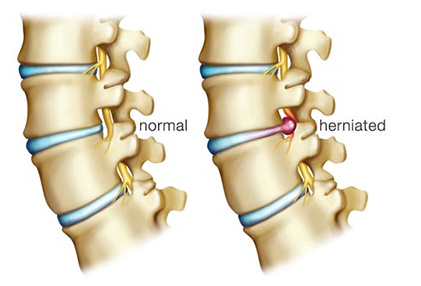
Herniated disc, also referred to as a slipped or ruptured disc, may occur anywhere in the spine, although it most often happens in the neck or lower back.
Potential Causes
A herniated disc is many times caused by aging. As a person ages over time, the cartilage outer layer of the discs can develop small tears or cracks. The gel that is located inside the disc can then be forced out through these tears, which cause the disc to bulge.
How & Why Do Herniated Discs Develop?
Our discs, which are composed of a thick outer ring of cartilage and an inner gel-like substance, act as shock absorbers. They are located between the vertebrae that make up the spinal column. The discs are soft and allow our backs to bend, but when the cartilage develops a defect or tear, the gel substance can be forced out, causing the disc to bulge out or herniate and thus putting pressure on the nerves. Our discs have a high water content when we are young, but as we grow older the amount of water content decreases, which causes the discs to become less pliable.
Some contributing factors that can increase the risk of weakening or damaging our discs include:
• Age
• History of back injuries
• Long periods of sitting
• Lifting heavy objects
• Repetitive motion
• High impact athletic activities
• Smoking
• Excessive body weight
• Heavy physical exertion
Symptoms
There are many symptoms of a herniated disc, depending on the location of the injured disc. Some symptoms you may experience include:
• Pain traveling down a leg to the ankle or foot because of pressure on the sciatic nerve
• Tingling “pins-and-needles” sensation or numbness in the leg that can begin at the buttock or behind the knee
• Pain in the front of the thigh
• Weakness in your leg
• Deep muscle pain and muscle spasms
Diagnosis
Accurate diagnosis of the source of pain is important to successfully treat a herniated disc. Orlando Pain & Spine Center can provide you with a diagnosis, which begins with:
• Thorough clinical evaluation
• Complete medical history, analysis of your symptoms, and physical examination
• Additional testing, such as MRIs, X-rays, CT scans, or EMG
